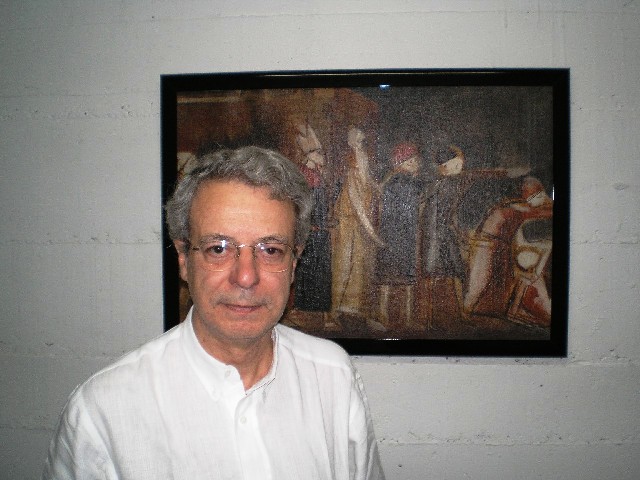Klaus Hart Brasilientexte
Aktuelle Berichte aus Brasilien – Politik, Kultur und Naturschutz
„Reflexions of an indignant voter“ – Brasiliens wichtigster Befreiungstheologe Frei Betto.
I watch election campaigning on television and listen to it on the radio and I ask myself: what galaxy am I living on? I also ask if the morbid parade of candidates is very different from the presentation of gladiators who were prepared to compete for the right to life in the Roman Coliseum.There is so much rubbish, so many inconsistent promises, so many offences to our language that I feel I prefer to visit the zoo where I can see a variety of caged animals without the bother of having to listen to so much nonsense.

Frei Betto beim Website-Interview in Sao Paulo.
http://www.hart-brasilientexte.de/2010/09/30/abtreibung-in-brasilien-abtreibungsbefurworterin-dilma-rousseff-andert-kurz-vor-pflichtwahlen-die-position-erklart-sich-zur-abtreibungsgegnerin-scharfe-kritik-von-marina-silva-und-jose-serra/Of course the huge amount of TVs and radios which are turned off during election programmes send out an obvious message: political reform is necessary now! As it will not happen immediately, everything points to the fact that as from 2011 we will once again see our political representatives – in the Legislative Assemblies, in the Chamber of Deputies and in the Senate – made up of respectable persons who are competent and ethical shoulder to shoulder with the riff raff of politicians elected thanks to their fame in the media because of sports, carousing or showing exuberant buttocks in the general shambles and not because of what they represent as promoters of the common good.Poor Brazil! Whose fault is it? The voters’? I disagree. The fault lies with political parties opening their doors to vote gatherers, to candidates who merely act as bait in order to strengthen party seats in the Legislature and accepting irresponsible members who simply want to use the party’s name. It doesn’t matter if the candidate doesn’t make any sense. What matters is managing to collect more votes.This reveals a very serious matter: the parties less and less represent a part or a segment of society. They represent themselves. They have become political clubs aiming at benefiting their members. They live separated from the social base, are proud of not having any ideology but having interests and, in all they do, they first seek to strengthen their own power. They function on the basis of activities between friends, those who were elected trying to get a well paid public position for those who were not.What Brazil needs, urgently, is reform of its political system. Changing the rules of the game is not enough. What is necessary is to modify the present political culture founded on friendship and nepotism (how can a minister possibly include family members in the government machine?), trafficking of influence and using State funds for one’s own benefit.Who are represented in our legislature? The answer is the elite, agro business, the lobbies for armaments, alcoholic beverages, devastation of the Amazon and the irresponsible opening of the country to foreign capital. They are the minority of the population, they are powerful, but they are a minority.Who represents the landless and the homeless? Who represents those who suffer from lack of health and education? Who represents the indigenous peoples, the people with special needs, the youth and the elderly? Who represents the popular movements?To introduce a new political culture is to create mechanisms for the civil control of the government so as to inhibit corruption, punish those who act contrary to the law and combat all that which, in Brazil’s socio economic structure, favours and strengthens several forms of inequality.The revocability of mandates, especially in cases of proved corruption, should figure as principle set in stone in our political system. Why should a person be allowed to be a candidate indefinitely perpetuating him/herself in politics? Nobody should have the right to more than two successive terms in the same position.
To be able to advance towards participative democracy, Brazil needs to reformulate its system of communication so that popular sectors can have free expression, so that plebiscites and popular consultations can be promoted, so that public financing of election campaigns can be adopted and so that mechanisms of social control of economic and budget policies can be created. Why is there no union representative in the direction of the Central Bank?
How can we talk about democracy if, in full presidential campaign, only four candidates have the right to take part in the TV debates? What about the rest? They were legally and legitimately chosen by their parties. It doesn’t matter that they are dwarf parties. Democracy is not made without equality. The voter has the right to know what proposals the official candidates to executive positions are making.
Since the end of the dictatorship in 1985, democracy has greatly improved in Brazil. However a country is not judged by the perfection of its laws, but by how those very laws are applied. The approval of Ficha Limpa (Clean Record – a law against corruption and impunity) shows that organised and mobilised civil society can do more than it believes it can. It is time not only to listen to what the candidates propose, but for the social movements and similar groups to present their proposals and suggestion to them.
Authority is the people – politicians are merely their servants.
*Frei Betto is a writer, author of “Calendario do Poder” (Calendar of Power) (Rocco). www.freibetto.org – twitter: @freibetto.
« „Das Monster der tausend Ideologien.“ Angeli, Folha de Sao Paulo, Ausriß. – Abtreibung in Brasilien – Abtreibungsbefürworterin Dilma Rousseff ändert kurz vor Pflichtwahlen die Position, erklärt sich zur Abtreibungsgegnerin. Scharfe Kritik von Marina Silva und José Serra. Die Rolle der evangelikalen Sektenpartei PRB, die Lulas Vize stellt. Befreiungstheologe Frei Betto. Abtreibung bei Indianern Amazoniens. »
Keine Kommentare
Noch keine Kommentare
Die Kommentarfunktion ist zur Zeit leider deaktiviert.
NEU: Fotoserie Gesichter Brasiliens
Links zum Thema Ukraine
Fotostrecken Wasserfälle Iguacu und Karneval 2008
interessante Links
Seiten
Ressorts
- Kultur (6.975)
- Naturschutz (1.101)
- Politik (12.729)
Suchen
RSS-Feeds
Verwaltung


